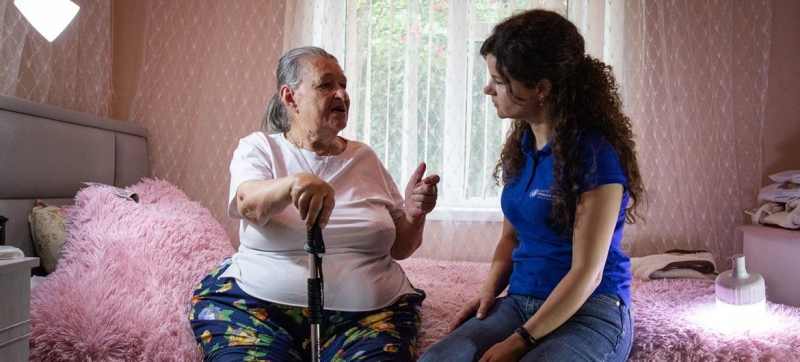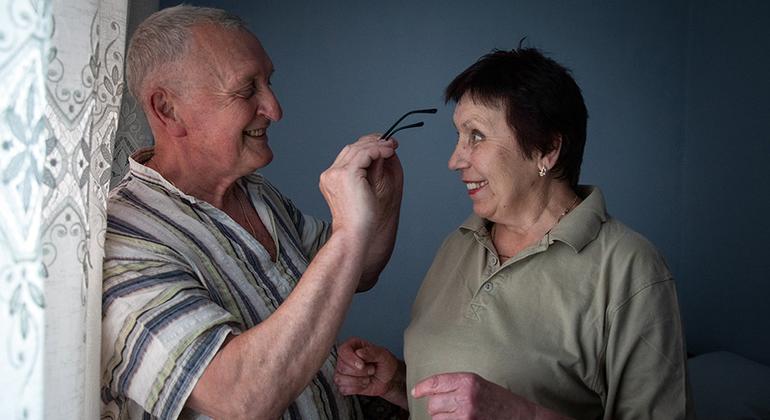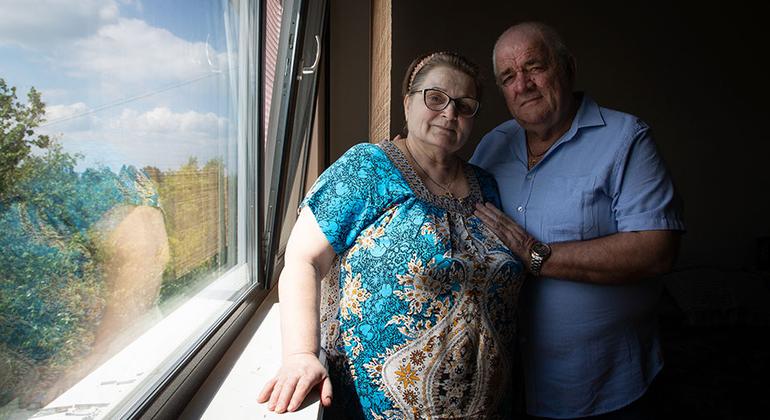
Lyubov, like many other Ukrainians, fled the war to Moldova. How the UN is helping the most vulnerable Ukrainian refugees in Moldova Refugees and migrants
From her bedroom window, Lyubov sees rose bushes and grape vines. This view helps the 83-year-old woman forget the air raid sirens and explosions that still echo in her head. Lyubov, like many other Ukrainians, fled the war to Moldova.
Ensure the rights of refugees
“People here are very welcoming. It’s quiet, I get my medication, but I miss my apartment in Odessa,” she said. “There are days when I want to pack my things and go back, but I’m so scared.”
Thanks to a project led by the UN Human Rights Office (OHCHR), Lyubov and hundreds of other Ukrainian refugees in Moldova receive medical care and assistance. Lyubov suffers from diabetes and is unable to get out of bed without assistance.
The programme, funded by the European Commission’s Civil Protection and Humanitarian Aid Department, aims to protect the rights of refugees with specific needs, such as the elderly, people with disabilities, children, single mothers and members of marginalized communities such as the Roma.
“Every refugee has a history of loss and trauma,” said Bea Ferenczi, Head of OHCHR Representative in Moldova. “This initiative aims to improve their access to services and assistance, and to ensure the rights of all refugees to equality and non-discrimination.”
Support that is essential
The Office’s staff has been providing support to Ukrainian refugees since the Russian Federation’s full-scale invasion on 24 February 2022. Almost a million Ukrainians have arrived in Moldova, and some 124,000 remain in the country to date.
According to the government, about 80 per cent of them are women, children and the elderly. They face a variety of challenges, including finding housing, lack of funds and difficulty accessing health care. According to a recent study by the Norwegian Refugee Council, many displaced people have exhausted their savings and are increasingly relying on humanitarian aid.
Across the Border on a Wooden Chair
When Lyubov realized that the air raids were continuing and her health was deteriorating, she packed a few things and took a bus to Moldova with her neighbor. Lyubov was too ill to walk, so Moldovan border guards literally carried her across the border on a wooden chair.
Today, she lives in a rented house in Bessarabka, in southern Moldova. With the support of OHCHR, Lyubov has started receiving diabetes medication provided by a local NGO.
Referral System
The project provides refugees with medication, diapers, walking aids, wheelchairs, glasses and hearing aids through a referral system that connects displaced persons with Moldovan and international NGOs.
The project covers all administrative districts of Moldova. During visits to humanitarian centers, distribution points and refugee accommodation centers, UN staff identify those in need of specialized services and refer them to the appropriate organizations.
The UN Human Rights Office in Moldova interviewed 2,130 Ukrainian refugees and 546 representatives of host communities, collecting comprehensive and disaggregated data on the different groups of displaced persons, their problems and needs.

“Now I can see him, and he can hear me”
Alexander and Olga are also among those who received assistance with the support of the OHCHR. Alexander is hard of hearing, but he still remembers how it felt when the walls and floor of his Kyiv apartment shook during Russian shelling. Olga has heart problems. She also recently underwent cataract surgery.
“My wife couldn’t sleep, and despite my hearing problems, I could feel the bombs exploding, so I didn’t sleep all night either,” says 73-year-old Alexander.
Despite their health problems, the couple decided to leave for Moldova.
“We’re here to calm our nerves,” explains Alexander.
An OHCHR staff member in Moldova highlighted the elderly couple’s special needs at a meeting at the Bessarabka City Hall. As part of the programme, Alexander received a hearing aid and Olga glasses, provided by a Moldovan NGO. The couple also receives free blood pressure medication.
“I had to get used to the hearing aid, but now I am very happy,” says Alexander.
“Now I can see him and he can hear me,” says Olga, 66.
Heart problems
Refugees Polina and Alexander live in a small rented apartment in Chisinau. Both suffer from heart problems.
After meeting with an OHCHR staff member at a government refugee center, they began receiving heart medication.
“Leaving our farm was a difficult decision,” says Polina, 67, a former school teacher. “We wanted to stay with our children and grandchildren. Now we are refugees.”
The couple describe how they had to hide in a basement with their grandchildren for five days while their village was shelled. They feel safe in Chisinau, but life is not easy. Polina and Alexander, who share an apartment with their grandson, are worried about their housing situation: their lease expires at the end of this month.

65-year-old Alexander tries his best to keep the family’s spirits up, sometimes humming a Ukrainian folk song, sometimes buying flowers for Polina.
“I never forget to give her flowers on May 8th. That was the day of our first kiss,” he says.
Return Home
The refugees are very grateful for the help they receive in Moldova, but almost all of them dream of returning home.
Olga recently began rearranging the furniture in her apartment so that everything would feel like home in Kyiv. She is looking forward to being reunited with her granddaughter Victoria: “I carry her picture close to my heart. We will be back. I have no doubt about it.”
